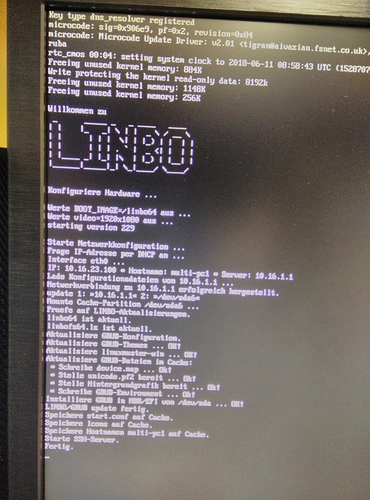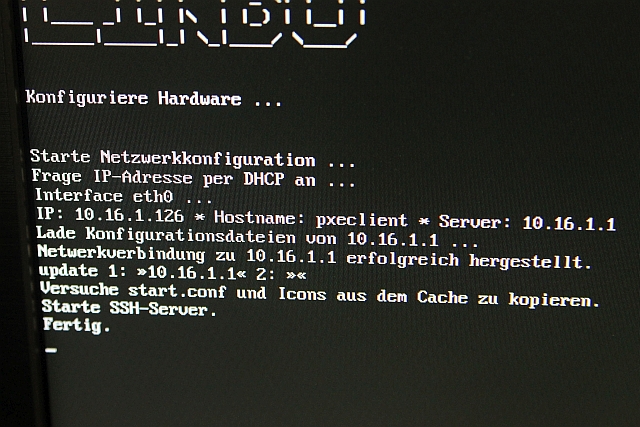Hallo
wir haben neue HP Prodesk 600 MT mit Intel i5 7500 7Gen erhalten. UEFI Modus aktiviert.
Nun kämpfe ich mit dem Problem das die Linbo Gui nicht erscheint. Partitionieren und formatieren mit
linbo_wrapper funtioniert. Kernel Optionen wie nomodeset habe ich auch schon ohne Erfolg probiert.
Hier dir boot.cfg:
# global part of group specific grub.cfg template for linbo net boot
# 20171107
#
# if you don't want this file being overwritten by import_workstations remove the following line:
# ### managed by linuxmusterpunktnet ###
# edit to your needs
set default=0
set timeout=0
set fallback=1
set gfxpayload=800x600x16
# 32bit pae, non pae or 64bit kernel
if cpuid -l; then
set linbo_kernel=/linbo64
set linbo_initrd=/linbofs64.lz
elif cpuid -p; then
set linbo_kernel=/linbo
set linbo_initrd=/linbofs.lz
else
set linbo_kernel=/linbo-np
set linbo_initrd=/linbofs-np.lz
fi
# theme settings (modify for custom theme)
set theme=/boot/grub/themes/linbo/theme.txt
#set font=/boot/grub/themes/linbo/unifont-regular-16.pf2
# load theme
#if [ -e "$theme" -a -e "$font" ]; then
# loadfont "$font"
export theme
#fi
clear
# find linbo cache partition
set cachelabel="cache"
if [ -n "$cachelabel" ]; then
search --label "$cachelabel" --set cacheroot
fi
if [ -z "$cacheroot" ]; then
search --file /start.conf --set cacheroot
fi
if [ -z "$cacheroot" ]; then
search --file "$linbo_initrd" --set cacheroot
fi
if [ -n "$cacheroot" ]; then
set root="$cacheroot"
else
set root="(hd1,6)"
fi
# linbo part, boot local or net (default #0)
menuentry 'LINBO' --class linux {
echo LINBO $bootflag for group hp600g3mt
echo
if [ -e "$linbo_kernel" -a -e "$linbo_initrd" ]; then
set bootflag=localboot
elif [ -n "$pxe_default_server" ]; then
set root="(tftp)"
set bootflag=netboot
fi
if [ -n "$bootflag" ]; then
echo -n "Loading $linbo_kernel ..."
linux $linbo_kernel video=1920x1080 $bootflag
echo
echo -n "Loading $linbo_initrd ..."
initrd $linbo_initrd
boot
else
if [ "$grub_platform" = "pc" ]; then
set ipxe="/ipxe.lkrn"
fi
if [ -e "$ipxe" ]; then
echo -n "Initiating pxe boot ..."
linux16 $ipxe dhcp
boot
fi
fi
}
# group specific grub.cfg template for linbo net boot, should work with linux and windows operating systems
# thomas@linuxmusterpunktnet
# 20171107
#
# start "Windows 10" directly
menuentry 'Windows 10 (Start)' --class win_start {
set oslabel="win10"
if [ -n "$oslabel" ]; then
search --label "$oslabel" --set osroot
fi
if [ -n "$osroot" ]; then
set root="$osroot"
else
set root="(hd1,3)"
fi
set win_efiloader="/EFI/Microsoft/Boot/bootmgfw.efi"
if [ -e /vmlinuz -a -e /initrd.img ]; then
linux /vmlinuz root=LABEL=win10
initrd /initrd.img
elif [ -e /vmlinuz -a -e /initrd ]; then
linux /vmlinuz root=LABEL=win10
initrd /initrd
elif [ -e /auto -a -e /noinitrd_placeholder ]; then
linux /auto root=LABEL=win10
initrd /noinitrd_placeholder
elif [ -e /auto ]; then
linux /auto root=LABEL=win10
elif [ -s /boot/grub/grub.cfg ] ; then
configfile /boot/grub/grub.cfg
elif [ "$grub_platform" = "pc" ]; then
if [ -s /bootmgr ] ; then
ntldr /bootmgr
elif [ -s /ntldr ] ; then
ntldr /ntldr
elif [ -s /grldr ] ; then
ntldr /grldr
else
chainloader +1
fi
elif [ -e "$win_efiloader" ]; then
chainloader $win_efiloader
boot
fi
}
# boot LINBO, sync and then start "Windows 10"
menuentry 'Windows 10 (Sync+Start)' --class win_syncstart {
if [ -e "$linbo_kernel" -a -e "$linbo_initrd" ]; then
set bootflag=localboot
elif [ -n "$pxe_default_server" ]; then
set root="(tftp)"
set bootflag=netboot
fi
if [ -n "$bootflag" ]; then
echo LINBO $bootflag for group hp600g3mt
echo
echo -n "Loading $linbo_kernel ..."
linux $linbo_kernel video=1920x1080 linbocmd=sync:1,start:1 $bootflag
echo
echo -n "Loading $linbo_initrd ..."
initrd $linbo_initrd
boot
fi
}
# boot LINBO, format os partition, sync and then start "Windows 10"
menuentry 'Windows 10 (Neu+Start)' --class win_newstart {
if [ -e "$linbo_kernel" -a -e "$linbo_initrd" ]; then
set bootflag=localboot
elif [ -n "$pxe_default_server" ]; then
set root="(tftp)"
set bootflag=netboot
fi
if [ -n "$bootflag" ]; then
echo LINBO $bootflag for group hp600g3mt
echo
echo -n "Loading $linbo_kernel ..."
linux $linbo_kernel video=1920x1080 linbocmd=format:3,sync:1,start:1 $bootflag
echo
echo -n "Loading $linbo_initrd ..."
initrd $linbo_initrd
boot
fi
}
# group specific grub.cfg template for linbo net boot, should work with linux and windows operating systems
# thomas@linuxmuster.net
# 20171107
#
# start "Linux Mint" directly
menuentry 'Linux Mint (Start)' --class linux_start {
set oslabel="linuxmint"
if [ -n "$oslabel" ]; then
search --label "$oslabel" --set osroot
fi
if [ -n "$osroot" ]; then
set root="$osroot"
else
set root="(hd1,4)"
fi
set win_efiloader="/EFI/Microsoft/Boot/bootmgfw.efi"
if [ -e /vmlinuz -a -e /initrd.img ]; then
linux /vmlinuz root=LABEL=linuxmint ro splash
initrd /initrd.img
elif [ -e /vmlinuz -a -e /initrd ]; then
linux /vmlinuz root=LABEL=linuxmint ro splash
initrd /initrd
elif [ -e /vmlinuz -a -e /initrd.img ]; then
linux /vmlinuz root=LABEL=linuxmint ro splash
initrd /initrd.img
elif [ -e /vmlinuz ]; then
linux /vmlinuz root=LABEL=linuxmint ro splash
elif [ -s /boot/grub/grub.cfg ] ; then
configfile /boot/grub/grub.cfg
elif [ "$grub_platform" = "pc" ]; then
if [ -s /bootmgr ] ; then
ntldr /bootmgr
elif [ -s /ntldr ] ; then
ntldr /ntldr
elif [ -s /grldr ] ; then
ntldr /grldr
else
chainloader +1
fi
elif [ -e "$win_efiloader" ]; then
chainloader $win_efiloader
boot
fi
}
# boot LINBO, sync and then start "Linux Mint"
menuentry 'Linux Mint (Sync+Start)' --class linux_syncstart {
if [ -e "$linbo_kernel" -a -e "$linbo_initrd" ]; then
set bootflag=localboot
elif [ -n "$pxe_default_server" ]; then
set root="(tftp)"
set bootflag=netboot
fi
if [ -n "$bootflag" ]; then
echo LINBO $bootflag for group hp600g3mt
echo
echo -n "Loading $linbo_kernel ..."
linux $linbo_kernel video=1920x1080 linbocmd=sync:2,start:2 $bootflag
echo
echo -n "Loading $linbo_initrd ..."
initrd $linbo_initrd
boot
fi
}
# boot LINBO, format os partition, sync and then start "Linux Mint"
menuentry 'Linux Mint (Neu+Start)' --class linux_newstart {
if [ -e "$linbo_kernel" -a -e "$linbo_initrd" ]; then
set bootflag=localboot
elif [ -n "$pxe_default_server" ]; then
set root="(tftp)"
set bootflag=netboot
fi
if [ -n "$bootflag" ]; then
echo LINBO $bootflag for group hp600g3mt
echo
echo -n "Loading $linbo_kernel ..."
linux $linbo_kernel video=1920x1080 linbocmd=format:4,sync:2,start:2 $bootflag
echo
echo -n "Loading $linbo_initrd ..."
initrd $linbo_initrd
boot
fi
}
Hier die start.conf:
# LINBO start.conf Beispiel mit EFI (GPT)
# EFI 64 Partition 1
# MSR Partition 2
# Windows 10 Partition 3
# Linux Mint Partition 4
# Swap Partition 5
# Cache auf Partition 6
[LINBO] # globale Konfiguration
Cache = /dev/sda6 # lokale Cache Partition
Server = 10.16.1.1 # IP des Linbo-Servers, der das Linbo-Repository vorhaelt
Group = hp600g3mt # Name der Rechnergruppe fuer die diese Konfigurationsdatei gilt
# Achtung: Server und Group werden beim Workstationsimport automatisch gesetzt!
SystemType = efi64 # moeglich ist bios|bios64|efi32|efi64 (Standard: bios fuer bios 32bit)
RootTimeout = 600 # automatischer Rootlogout nach 600 Sek.
AutoPartition = no # automatische Partitionsreparatur beim LINBO-Start
AutoFormat = no # kein automatisches Formatieren aller Partitionen beim LINBO-Start
AutoInitCache = no # kein automatisches Befuellen des Caches beim LINBO-Start
DownloadType = rsync # Image-Download per torrent|multicast|rsync, default ist rsync
BackgroundFontColor = white # Bildschirmschriftfarbe (default: white)
ConsoleFontColorStdout = white # Konsolenschriftfarbe (default: white)
ConsoleFontColorStderr = red # Konsolenschriftfarbe fuer Fehler-/Warnmeldungen (default: red)
KernelOptions = video=1920x1080 # Beispiele:
#KernelOptions =quiet splash acpi=noirq irqpoll intel_pstate=skylake_hwp # LINBO Kerneloptionen (z. B. acpi=off), m. Leerz. getrennt
#KernelOptions = server=10.16.1.5 # Abweichende Linbo-Server-IP als Kerneloption gesetzt
# falls gesetzt wird diese IP beim Workstationsimport verwendet
[Partition] # Partition fuer EFI
Dev = /dev/sda1 # Device-Name der Partition (sda1 = erste Partition auf erster Platte)
Size = 200M # Partitionsgroesse (Bsp.: 200M), ist keine Einheit (M, G oder T) angegeben, wird kiB angenommen
Id = ef # Partitionstyp (83 = Linux, 82 = swap, c = FAT32, 7 = NTFS, ef = efi)
FSType = vfat # Dateisystem auf der Partition (FAT32)
Bootable = yes # Bootable-Flag gesetzt
Label = efi # Partitionslabel efi (efi system partition)
[Partition] # Partition fuer MSR
Dev = /dev/sda2 # Device-Name der Partition (sda2 = zweite Partition auf erster Platte)
Size = 128M # Partitionsgroesse 128M
Id = 0c01 # Partitionstyp 0c01
FSType = # kein Dateisystem
Bootable = no # kein Bootable-Flag
Label = msr # Partitionslabel msr (microsoft reserved partition)
[Partition] # Partition fuer Windows
Dev = /dev/sda3 # Device-Name der Partition (sda3 = dritte Partition auf erster Platte)
Size = 50G # Partitionsgroesse 30G
Id = 7 # Partitionstyp 83
FSType = ntfs # Dateisystem ext4
Bootable = no # kein Bootable-Flag
Label = win10 # Partitionslabel win10
[Partition] # Partition fuer Ubuntu
Dev = /dev/sda4 # Device-Name der Partition (sda4 = vierte Partition auf erster Platte)
Size = 30G # Partitionsgroesse 30G
Id = 83 # Partitionstyp 83
FSType = ext4 # Dateisystem ext4
Bootable = no # kein Bootable-Flag
Label = linuxmint # Partitionslabel ubuntu
[Partition] # Swap-Partition
Dev = /dev/sda5 # Device-Name der Partition (sda5 = fuenfte Partition auf erster Platte)
Size = 2G # Partitionsgroesse 4G
Id = 82 # Partitionstyp 82
FSType = swap # Dateisystem swap
Bootable = no # kein Bootable-Flag
Label = swap # Partitionslabel swap
[Partition]
Dev = /dev/sda6
Size = 80G
Id = 83
FSType = ext4
Bootable = no
Label = cache
[OS]
Name = Windows 10
Version =
Description = Windows 10
IconName = win10.png
Image =
BaseImage = win10.cloop
Boot = /dev/sda3
Root = /dev/sda3
Kernel = auto
Initrd =
Append =
StartEnabled = yes
SyncEnabled = no
NewEnabled = yes
Hidden = yes
Autostart = no
AutostartTimeout = 5
DefaultAction = start
[OS]
Name = Linux Mint
Version =
Description = Mint 18.03
IconName = mint.png
Image =
BaseImage = mint18.cloop
Boot = /dev/sda4
Root = /dev/sda4
Kernel = vmlinuz
Initrd = initrd.img
Append = ro splash
StartEnabled = yes
SyncEnabled = yes
NewEnabled = yes
Hidden = yes
Autostart = no
AutostartTimeout = 5
DefaultAction = start
Der PC bleibt stehen bei folgender Meldung:
Dann müßte er auf den Linbo Bildschirm umschalten. Das passiert nicht.
Drückt man Enter schaltet sich der PC aus.
Bitte um Hilfe.
Gruß
Uwe


